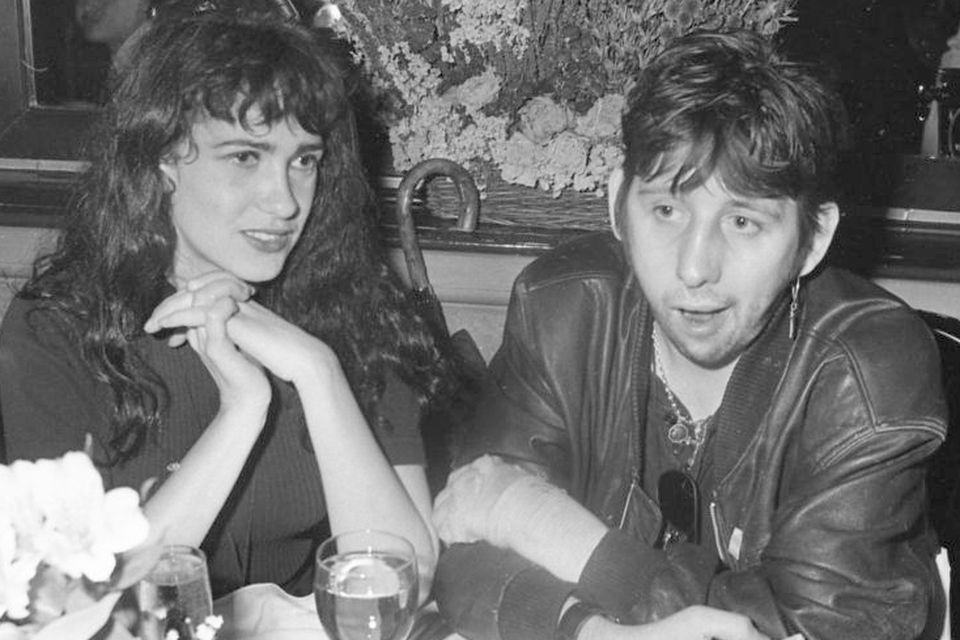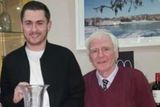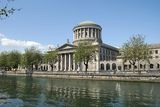Obituary: Shane MacGowan, songwriter who fused punk and traditional Irish music and shone amid his own chaos
Victoria Mary Clarke and Shane MacGowan in Dublin in 1993. Photo: INM
Shane MacGowan was among the most talented song-writers of his generation, a performer with remarkable stage presence and a Rabelaisian character who based his hard-drinking lifestyle on bohemian Dublin characters like Brendan Behan and Gainor Crist the feckless anti-hero of The Ginger Man.
His best-known song, Fairytale of New York, takes its title from another JP Donleavy book. Achingly poetic, the original version featuring MacGowan with Kirsty MacColl has been much imitated, but never bettered.
MacGowan also wrote and recorded other songs widely regarded as classics, including A Rainy Night in Soho, A Pair of Brown Eyes and If I Should Fall from Grace with God. With a career that began in London in the early 1980s, he became as well known for his poignant, poetic ballads as for his sometimes chaotic live performances with The Pogues, The Popes and as a solo artist.
Playing with shifting groups of musicians, MacGowan with his seemingly self-destructive personality inspired a raggle-taggle audience of fans who aspired to the same hard-charging lifestyle as their hero, but were largely able to switch off and go home after a wild night at one of his concerts.
Shane Patrick Lysaght MacGowan, who died last Thursday at the age of 65, was born on Christmas Day 1957 in Pembury, Kent, south-east England. At three months, he was taken to his grandparents’ house in Tipperary, where he lived until the school-going age of six.
His father Maurice, originally from Dublin, was a middle manager for the clothing retailer C&A, while his mother, Therese Lynch, was from the hamlet of Carney Commons near Borrisokane, where Shane and his sister Siobhan spent most of their summer holidays. They later relocated to the village of Silvermines.
The MacGowans and the Lynches had been in contact since before the Civil War, MacGowan told Ireland’s Own in 2018. The singer, who had a lifelong fondness for that weekly magazine, further recalled: “My parents met in Limerick one night when he was down the country from Dublin looking for the craic. They were friends for about eight years, before they became lovers.”
Therese MacGowan was an accomplished singer and Irish dancer who had participated at the Feis Ceoil and taught her children many of the songs and ballads, in both Irish and English, she had grown up with.
In March 2000, after leaving the Priory Clinic in England following his arrest for heroin possession (though he was not charged) MacGowan described his heritage to a journalist from The Observer. “‘I’m completely Irish’ he said in an accent that is completely English,” Andrew Anthony wrote. “He says he had the voice ‘kicked out of him’. He described his first feeling on arriving in England as ‘disgust, hatred, fear, loathing’ and went on to dismiss England as ‘a miserable, stinking, boring, stupid, useless waste of time’. We were both being filmed by an Irish documentary team, I suspected some of this invective was not for my benefit but for that of the viewers.”
After attending a school in Kent, MacGowan got a scholarship to London’s Westminster School where, in a portent of things to come, he was expelled in his second year after being found in possession of drugs.
Inspired by the new wave of punk, he founded the band Pogue Mahone around 1982, with tin-whistle player Peter ‘Spider’ Stacy, who he met in the toilets at a Ramones gig in 1977. They were later joined by Jem Finer (banjo), singer and songwriting collaborator Cait O’Riordan and James Fearnley (accordion).
Playing pubs, clubs, and dives around Camden and other Irish enclaves, they shortened their name to The Pogues and came to the attention of the media, and the punk record label Stiff Records, when they opened for The Clash on their 1984 tour. Their debut album, Red Roses For Me, came out in October of that year to critical acclaim. They also did a raucous ‘Irish ballad meets punk’ concert for Channel 4 music show The Tube, which got them wider attention and added to their growing notoriety.
As a songwriter, MacGowan was influenced by the writing of Brendan Behan and James Clarence Mangan, whose work included the poem My Dark Rosaleen and other Irish nationalist songs and verse. With Phil Chevron joining on guitar, the band went on to make the critically acclaimed Rum Sodomy & The Lash, which was produced by Elvis Costello.
In late November 1987 The Pogues released the masterpiece song Fairytale of New York, which had been written over a lengthy period by MacGowan and Finer. Despite MacGowan’s increasingly erratic behaviour, the band had earlier had another hit, this time with The Dubliners, singing a version of The Irish Rover and making a memorable appearance on Top of the Pops.
In January 1988 came the album If I Should Fall from Grace with God, released to more rave reviews. It was a record that perhaps saw MacGowan at the peak of his creative powers. Next came the patchier Peace and Love, the title of which may have been ironic as there was, by then, little peace or love in The Pogues. MacGowan’s prodigious appetite for alcohol and drugs was increasingly causing tension in the band and he often appeared on stage drunk, in a fog of drugs, forgot the words of songs and fell off stage.
The last album he recorded with The Pogues was Hell’s Ditch (1990), which included notable MacGowan compositions such as Summer in Siam and Lorca’s Novena, tracks that proved his songwriting touch had not deserted him.
The following year, however, rising tensions within the band over MacGowan’s increasingly erratic behaviour culminated in him being ignominiously sacked.
He embarked on a solo career and played with a new band, The Popes, but alcohol and drug addiction were increasingly afflicting his lifestyle and his ability to perform.
The list of casualties among those in his orbit was unfortunately long and tragic. Because of his own addiction he was unable or unwilling to deal with the fallout from this hedonistic lifestyle.
In March 1995 a sound engineer, Dave Jordan, died of an overdose in Paris while working with MacGowan and The Popes. In May the same year friend and fan of MacGowan’s, Bryan Ging — known as Ginger — died after an overdose of alcohol and morphine while staying in MacGowan’s house in London.
In a further tragedy, in May 1999, Robbie O’Neill, a son of The Pogues’ publicist Terry O’Neill, died of an overdose while staying in MacGowan’s flat in Hampstead Heath. The singer claimed they had stayed up together until 2am and he then went to bed and slept for 22 hours. When he woke at 1.30am the following day, he said, he found the 25-year-Dubliner dead.
At the inquest the coroner was deeply critical of MacGowan, who did not attend the hearing.
“I understand that he called himself a friend of yours,” he told Terry O’Neill. “So there you are, you know what kind of friend you have.” In the year 2000, after he had been reported to police for misuse of drugs by Sinéad O’Connor, MacGowan put out a statement which concluded: “I am beginning to feel a lot of people are dying in my flat.”
After signing himself into The Priory, he was later thrown out and appeared at the Mean Fiddler pub in Harlesden, north-west London, where fans presented him with a bottle of gin and a can of lager.
“It was noticeable that, despite holding on to the bottle of gin and also accepting a can of lager chaser, MacGowan didn’t take so much as a sip from either in the hour we spent together” the Observer’s Andrew Anthony, who was with him that morning, wrote.
Asked by Anthony about his own “mythology” as a hellraiser, he replied: “I’m aware of it but I don’t think about it. I don’t think. You know, William Burroughs said ‘exterminate all rational thought’.”
The MacGowan family suffered their own personal tragedy on New Year’s Day 2017 when Therese MacGowan, who was 87, was killed when her car hit a wall near Silvermines, where she was living with Maurice. The Pogues manager Frank Murray (66) had died of a heart attack a week earlier.
The Pogues, with MacGowan, reformed for tours of the UK and Ireland and elsewhere in 2001. But it wasn’t a happy reunion, apart from the earnings. As he told Vice magazine: “I went back with Pogues and we grew to hate each other all over again… I don’t hate the band like — they’re friends. I like them a lot. We were friends for years before we joined the band. We just got a bit sick of each other. We’re friends as long as we don’t tour together. I’ve done a hell of a lot of touring. I’ve had enough.”
It probably was no surprise that he wanted to give it up. Fans continually wanted to supply him with drugs and drink. Mind-numbing years on the road, including falling out of the tour van when it was travelling at 80kmh, had not helped his health, which was critically compromised at this stage of his life.
In December 2005 Fairytale of New York was re-released and went straight to No 3 in the British charts on Christmas Day.
MacGowan and his friend and admirer, the Hollywood actor Johnny Depp, also made several attempts to film Donleavy’s book, The Ginger Man, with the blessing of the author and spent periods at his mansion on the shores of Lough Owel in Co Westmeath. But the project never got beyond the drawing board.
In November 2018, MacGowan married Victoria Mary Clarke, his long-time girlfriend and a contributor to the Sunday Independent. By this time the singer was largely confined to a wheelchair, although he went on to make appearances in Liverpool and Dublin, with friends such as Chrissie Hynde and The Pretenders, Imelda May, Paddy Moloney and the US musician Albert Hammond Jr.
Clarke once said MacGowan’s “whole career has revolved around it [drink] and indeed been both enhanced and simultaneously inhibited by it”.
A broken hip from a fall and the resulting pain required long stays in hospital and MacGowan was totally sober, she said. Hospitalised again in December last year he was diagnosed with encephalitis, an inflammation of the brain, and only recently Clarke thanked fans for their concern and shared a photograph of her desperately ill-looking husband.
MacGowan was undoubtedly a songwriting genius. Despite the chaos of his lifestyle, when he stood on stage the magic happened, especially when he was sober and on good behaviour, as he was when I saw him singing at the wake for his friend Ronnie Drew.
MacGowan received many honours for his music and songwriting and was particularly moved by a tribute in the National Concert Hall, Dublin, in January 2018 when many of the stars he had met and some he had inspired played in tribute to him. He was awarded a lifetime achievement award by the Irish music industry and an Ivor Novello Inspiration Award by his peers in the UK.
MacGowan is survived by his wife Victoria Mary, his sister Siobhan and father Maurice.
Join the Irish Independent WhatsApp channel
Stay up to date with all the latest news















